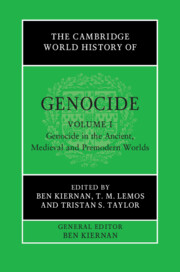Book contents
- The Cambridge World History of Genocide
- The Cambridge World History of Genocide
- The Cambridge World History of Genocide
- Copyright page
- Contents
- Figures
- Maps
- Tables
- Contributors to Volume I
- General Editor’s Acknowledgements
- General Editor’s Introduction to the Series
- Introduction to Volume I
- Part I Themes of Genocide through History
- Part II The Ancient World
- Part III The Medieval World and Early Imperial Expansions
- 15 William the Conqueror’s Harrying of the North, 1069–1070
- 16 Genocidal Massacres of Jews in Medieval Western Europe, 1096–1392
- 17 Crusaders and Mass Killing at Jerusalem in 1099
- 18 The Albigensian Crusade and the Early Inquisitions into Heretical Depravity, 1208–1246
- 19 Mongol Genocides of the Thirteenth Century
- 20 Việt Nam and the Genocide of Champa, 1470–1509
- 21 Genocidal Massacres in Medieval India
- 22 Mass Extermination in Prehistoric Andean South America
- 23 The Spanish Destruction of the Canary Islands
- 24 Genocidal Massacres in the Spanish Conquest of the Americas
- Index
19 - Mongol Genocides of the Thirteenth Century
from Part III - The Medieval World and Early Imperial Expansions
Published online by Cambridge University Press: 23 June 2023
- The Cambridge World History of Genocide
- The Cambridge World History of Genocide
- The Cambridge World History of Genocide
- Copyright page
- Contents
- Figures
- Maps
- Tables
- Contributors to Volume I
- General Editor’s Acknowledgements
- General Editor’s Introduction to the Series
- Introduction to Volume I
- Part I Themes of Genocide through History
- Part II The Ancient World
- Part III The Medieval World and Early Imperial Expansions
- 15 William the Conqueror’s Harrying of the North, 1069–1070
- 16 Genocidal Massacres of Jews in Medieval Western Europe, 1096–1392
- 17 Crusaders and Mass Killing at Jerusalem in 1099
- 18 The Albigensian Crusade and the Early Inquisitions into Heretical Depravity, 1208–1246
- 19 Mongol Genocides of the Thirteenth Century
- 20 Việt Nam and the Genocide of Champa, 1470–1509
- 21 Genocidal Massacres in Medieval India
- 22 Mass Extermination in Prehistoric Andean South America
- 23 The Spanish Destruction of the Canary Islands
- 24 Genocidal Massacres in the Spanish Conquest of the Americas
- Index
Summary
The term genocide has often been applied to the Mongol conquests in the thirteenth century, as well as many other pre-modern groups. Legally, the 1948 UN Convention on the Prevention and Punishment of the Crime of Genocide can only be applied anachronistically to the Mongols, but the Mongols have been accused of genocide of the Tatars (1202) as well as the Tangut (1227). Yet, these accusations often misunderstand the events themselves, not to mention the motives of not only the Mongols, but also the purpose of those actions. This is not to say that the Mongols did not employ massacres and other actions of mass destruction. Indeed, massacres were used widely, but often more judiciously that one might expect. Indeed, rape, pillage and plunder was standard not only for the Mongols but virtually all military organizations of the era.
While the legal application of the UN Convention definition may be impractical, nonetheless, investigating its attribution to the Mongols can be a useful exercise as it can help us understand not only the era and methods of violence employed, but also how the Mongols understood and rationalized their actions. Of greater significance is the employment of Leo Kuper’s concept of “genocidal massacres”. This concept cannot be considered anachronistic in any sense. Furthermore, it lends itself to a broader understanding of whether these “genocidal massacres” lead to a broader pattern of actions that might properly fall under the umbrella of genocide as defined by the UN Convention on the basic principle described by Douglas Adams, “If it looks like a duck, and quacks like a duck, we have at least to consider the possibility that we have a small aquatic bird of the family anatidae on our hands”.
Additionally, this study cannot be confined strictly to episodes of violence. In order to properly understand genocide in the context of the Mongol Empire, or any entity, one must understand other policies (both direct and indirect) that may be connected to the genocidal act. This is all the more important as the Mongol Empire emerged from the steppes which in the 12th century had numerous tribal entities into a single polity known as the Yeke Monggol Ulus. The use of the term ulus is particularly important. While it eventually acquired the meaning of “patrimony” and then later “nation or country” as it does today (Mongolia’s name in Mongolian is Mongol Uls), in the thirteenth century it was only used by the Mongols to refer to the various Mongol lineages. Other non-Mongol groups were considered irgen or people. There was a clear identification of the other. Thus, we must also consider whether the establishment of the Yeke Monggol Ulus was simply the melding of diverse groups, whether through voluntary or coercive actions, or perhaps something a bit different and did this Mongols apply massacres, deportations, and others aspects related to genocide and extermination as instruments of state creation in the creation of the Yeke Monggol Ulus.
- Type
- Chapter
- Information
- The Cambridge World History of Genocide , pp. 498 - 522Publisher: Cambridge University PressPrint publication year: 2023

